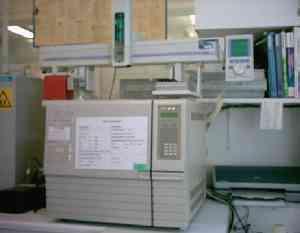Gas chromatography is an analytical technique employing a gaseous mobile phase that separates mixtures into their individual components. The stationary phase can be solid or immobilized liquid. The separation is based on dynamic sorption-desorption processes. Compounds volatilized without decomposition can be separated. The technique is not suitable for the separation of ionic compounds and of large molecules like proteins, peptides, polysacharides, etc. In environmental analysis gas chromatography is applied for the measurement of volatile and semivolatile organic compounds (VOC and SVOC, resp.) in air, in surface and subsurface water, as well as in potable water, in soil, of residual content of a chemical in food, in animal and plant samples. It is applied for identification of the source of the contamination, the transport of contaminants, bioaccumulation, assessment of contaminated sites, technology monitoring, etc. (Source: Balla J.: Analytical applications of gas chromatography, Budapest, 1987)
Balla J.: A gázkromatográfia analitikai alkalmazásai. Budapest, 1987
